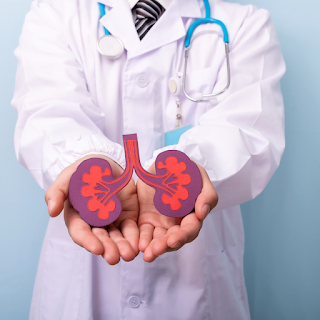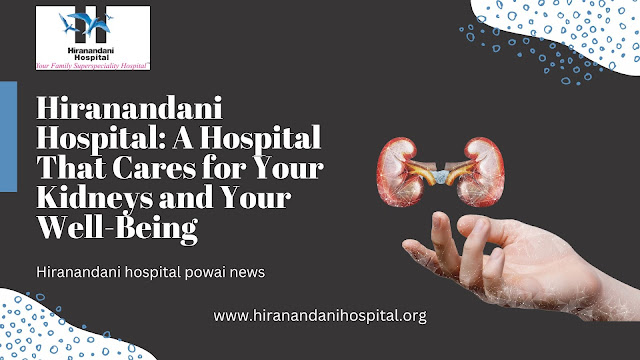Taking Care of Your Kidneys After 40: Essential Tips for Optimal Kidney Health
To ensure our kidneys remain healthy and fully
functional, it's essential to adopt certain lifestyle habits and practices as
we age. In this article, we will explore valuable tips to take care of your
kidneys after age 40 by Dr.
Sujit Chatterjee CEO, Hiranandani Hospital.
Stay Hydrated: Proper hydration is key to maintaining healthy kidney function. Drinking an adequate amount of water helps flush out toxins and waste products from your kidneys. Aim to drink at least eight glasses of water per day, or more if you engage in physical activities or live in a hot climate.
Maintain a Balanced Diet: A well-balanced diet plays a significant role in kidney health. Incorporate a variety of fruits, vegetables, whole grains, lean proteins, and healthy fats into your meals. Limit your intake of processed foods, high-sodium snacks, and sugary beverages, as these can strain your kidneys and contribute to the development of kidney problems.
Manage Blood Pressure and Blood Sugar Levels: High blood pressure and diabetes are the leading causes of kidney disease. It's crucial to monitor and manage these conditions effectively. Adopt a low-sodium diet, engage in regular exercise, and take prescribed medications as directed by your healthcare provider to control blood pressure. Similarly, maintain healthy blood sugar levels through a balanced diet, regular physical activity, and proper medication management if you have diabetes.
Quit Smoking: Smoking is detrimental to overall health, including kidney health. Smoking can impair blood flow to the kidneys and increase the risk of kidney damage and disease. If you smoke, seek assistance from healthcare professionals to quit this harmful habit.
Limit Alcohol Consumption: Excessive alcohol consumption can have a negative impact on your kidneys. It can lead to dehydration and increased blood pressure. Limit alcohol intake to moderate levels, which means no more than one drink per day for women and two drinks per day for men.
Exercise Regularly: Regular physical activity is beneficial for overall health, including kidney health. Engaging in aerobic exercises, such as walking, swimming, or cycling, helps maintain a healthy weight, control blood pressure, and improve circulation. Aim for at least 30 minutes of moderate-intensity exercise most days of the week.
Be Careful with Pain Relievers: Some over-the-counter pain relievers like ibuprofen and naproxen can harm your kidneys if you take them too often or for a long time. Before using any medications regularly, it's best to talk to your healthcare provider and follow the recommended dosage instructions.
Visit the Doctor Regularly: Going for regular check-ups is important to keep an eye on your overall health, including your kidneys. Make sure to see your healthcare provider for blood pressure checks, urine tests, and blood tests. These helps evaluate how well your kidneys are working and catch any problems early on.
Manage Stress: Chronic stress can have a negative impact on your overall health, including your kidneys. Find healthy ways to manage stress, such as practicing relaxation techniques, engaging in hobbies, connecting with loved ones, or seeking professional help if needed. Maintaining a balanced emotional state contributes to optimal kidney health.
Stay Informed and Educated: Keep yourself updated on the latest information and research related to kidney health. Learn about the risk factors, symptoms, and preventive measures associated with kidney disease. This knowledge empowers you to make informed decisions and take proactive steps to protect your kidney health.
In conclusion, taking care of your kidneys after age 40 is of utmost importance. By following these essential tips given by Hiranandani hospital kidney transplant like staying hydrated, maintaining a balanced diet, managing blood pressure and blood sugar levels, quitting smoking, limiting alcohol consumption, exercising regularly, avoiding overuse of pain relievers, getting regular check-ups, managing stress, and staying informed, you can significantly reduce the risk of kidney disease and promote optimal kidney health. Remember, it's never too late to prioritize your well-being, and taking care of your kidneys is a vital part of the journey to a healthier and happier life.



Comments
Post a Comment